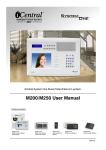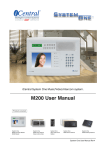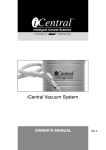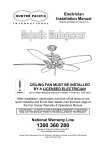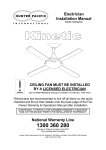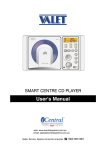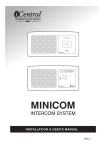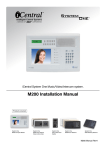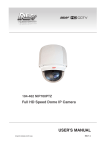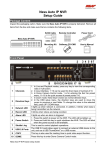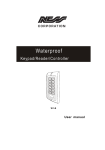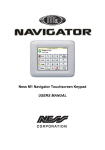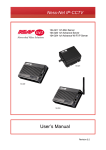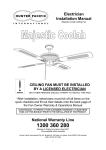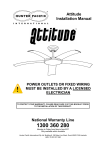Download iCentral Vacuum Installation Manual
Transcript
Quality by iCentral Vacuum Systems Installation manual Rev 1 Central Vacuum Intercom Security Automation www.icentralsystems.com.au Sales - Service - Spares 1300 050 333 iCentral Trade & Dealer Enquiries Head Office Ness Security Products Pty Ltd ABN 28 069 984 372 Ph +61 2 8825 9222 Fax +61 2 9674 2520 [email protected] C o r p o r at i o n www.ness.com.au Ness Branches: SYDNEY Ph 02 8825 9222 [email protected] MELBOURNE Ph 03 9875 6400 [email protected] PERTH Ph 08 9328 2511 [email protected] BRISBANE Ph 07 3399 4910 [email protected] ADELAIDE Ph 08 8152 0000 [email protected] Contents Safety Instructions . . . . . . . . . . . . . . . . . . . . . . . . . . . . . . . . . . . . . . . . . . . . . 4 Cleaning Tools . . . . . . . . . . . . . . . . . . . . . . . . . . . . . . . . . . . . . . . . . . . . . . . . 5 Vacuum Inlets. . . . . . . . . . . . . . . . . . . . . . . . . . . . . . . . . . . . . . . . . . . . . . . . . 5 Power Unit. . . . . . . . . . . . . . . . . . . . . . . . . . . . . . . . . . . . . . . . . . . . . . . . . . . . 5 Sealed Bag Systems How to Change the bag. . . . . . . . . . . . . . . . . . . . . . . . . . . . . . . . . . . . . . . . . 6 Cyclonic Systems How to empty the dirt canister. . . . . . . . . . . . . . . . . . . . . . . . . . . . . . . . . . . . 7 Troubleshooting Guide Table. . . . . . . . . . . . . . . . . . . . . . . . . . . . . . . . . . . . . 8 Troubleshooting Guide descriptions . . . . . . . . . . . . . . . . . . . . . . . . . . . . 9, 10 iCentral Vacuum Installer’s Manual Intended only for Household and Light Commercial Use Important Safety Instructions Before installation or use please proceed to: • Read the Installation Manual and ensure correct Installation • Read the User Manual and ensure correct use of the product/s at all times • Check and empty the dust bag or bin regularly •Do not install outside unless proper weather protection is in place •Do not connect to a non grounded supply or a no approved supply •Do not service the Motor Unit unless it has been disconnected from the supply •Do not use with a damaged electrical lead or plug •Keep electrical lead away from heated or sharp objects •Keep inflammable objects or liquids away from the Motor Unit •Do not place or store anything on top of the Motor Unit •Do not place or store anything that may restrict the air flow of the Motor Unit •Do not vent the Motor Unit into a wall, a ceiling, or any enclosed space •Do not vacuum on any wet surfaces •Do not vacuum any liquids, including any fuels •Do not vacuum anything that is hot, burning or smoking •Do not vacuum any ash, even it appears dormant •Avoid vacuuming plaster dust or talcum powder, which can cause clogging and bursting of vac bags •Do not obstruct, block or impede the hose or wall valve inlets •Keep hair, all parts of the body and loose clothing away from the hose or wall inlets •Do not use non recommended attachments or accessories •Pay close attention to children while the system is being used •Do not allow children to use the system as a toy Warning improper use may cause fire, electric shock or injury Central Vacuum Installation Guide Plan Ahead Planning is the key to a successful Central Vacuum installation. Essentially, the plan will come down to determining the best location for the wall inlet valves and the power unit. From there, the pathway for the PVC ducting should, wherever possible follow the most direct and shortest run. Three Easy Steps to Installation Step The Power Unit The power unit can usually be installed in a garage, basement or utility room. If it needs to be located externally, proper weatherproofing is essential and the correct model must be used. It is generally best to choose a location near an exterior wall to minimize the length of the exhaust run. The unit will require a 240 Volt electrical outlet within a metre, and should not be boxed in or enclosed. The motor must be able to freely draw fresh air and blow exhaust air. Tip. Do not glue the PVC connector nearest to the Power Unit, to provide easier future service. Remember that the unit should be accessible for easy replacement of the bag or emptying the dust bin. Step Inlet Valve Locations Inlet valves are usually placed on interior walls, in hallways, near doorways or close to the bottom of stairways. Potential furniture placement should be considered when determining valve locations. The objective is to use as few inlet valves as possible to achieve maximum use of the 9 metre hose, while providing whole house coverage. Lay out your inlet locations on a plan of the premises. Inlet valves can be situated between studs, clear of obstructions like plumbing, wiring, heating ducts, etc. They are typically positioned level with the height of electrical outlets. In new home installations, the system should be installed at “frame” stage. Step PVC Ducting and Low Voltage Wiring Ducting and low voltage wiring are run together from the Power Unit to each valve location, in the most direct line possible. The wiring can be looped or terminated at each inlet valve The amount of airflow that is achieved at the hose is dependent on the efficiency of the layout of the PVC ducting. Keep the line as straight as possible and avoid using tight 90° fittings and try to use 90° sweeps wherever possible. Good Installation Standards Correct Cut PVC with a Mitre Box or Tube Cutter and deburr the cut ends with sandpaper or a de-burring tool. Correct Apply glue to the outside of pipe only. Correct TY in the right direction. Correct Dirt should flow from the side or top of PVC ducting. Wrong Correct Improper cutting will not give a clean or square end. Efficient air flow. Wrong Correct Glue applied to the inside may accumulate and cause blockages. Only use approved Vacuum PVC. Wrong Correct TY in the wrong direction. 90° sweeps provide best efficiency. Wrong Correct Gravity can cause dirt to fall down the wrong line. Loop wire at inlet points so connection is available for service. Wrong Poor air flow. Wrong Plumbing fittings are not designed for efficient air flow. Wrong 90° short elbows reduce efficiency. Wrong Connections joined at junctions may be difficult to access later for service. Installation No doubt you will have planned the Installation, understood the Good Installation Standards, and are prepared for a smooth Installation. Check that you have the correct material and proper tools to complete the job without disruption. Ideally, you will have already completed some training or at least been involved with another Central Vacuum Installation, so you will have picked up some valuable knowledge. In any event, the following tips may help you: PVC Fittings Similarly to the PVC Ducting, the international standard size for PVC fittings is 2 inches ID (50.8mm), and are generally only available from dedicated Central Vacuum Suppliers and Installers. Poor quality fittings should absolutely be avoided. Loose fitting may leak and tight fittings will slow down the installation time, and will have a tendency to crack. Always use the most appropriate fitting that will provide the most efficiency in air flow, rather that use the fitting that you may be on hand at that time. Do not apply glue to the fitting, as glue applied to the inside of a fitting may be pushed ahead and create a rough bead which will reduce airflow and may cause a blockage. PVC Ducting The international standard size for PVC Ducting is 2 Inches OD (50.8mm), so in Australia, the ducting is generally only available from dedicated Central Vacuum suppliers and installers. The ducting should be inserted all the way into the fitting and turned a quarter of a turn to distribute the glue evenly. As quality will vary, it is recommended that you avoid poor quality PVC which may frustrate you with too loose or too tight assembly with the fittings. Accurate cutting, proper cleaning, and gluing is critical to avoid leaks and possible future blockages. Care is required when installing in new home constructions so that the ducting is not damaged or fixed in locations that may interfere with other trades. Any resulting leak after the ducting is covered by a wall may prove difficult to repair. Low Voltage Wiring Wall Valves Figure 8 low voltage wiring/cable is readily available throughout Australia, generally in 14/0.20 or 24/0.20 gauges. There are different shapes, colour, and quality wall valves, so you will no doubt want to choose the most attractive, but also a well made valve that will not leak, and of course last. It is recommended that you always use good quality cable, and be careful to run and secure the cable in a manner that will provide the best protection from future damage. The cable is usually best run together with the PVC ducting, and can usually be strapped to the ducting. The valves are generally available with either a “pin jack” arrangement, where, on inserting the hose, the pins are shorted and the Vac is switched on, or instead will have a micro switch in the valve where the hose will simply make contact with the switch and turn the Vac on. The cable will run from the motor to the first inlet valve, loop, and then to the next inlet valve and so on. It is recommended that the connections are made at the inlet valves so they are accessible in the future, rather that join the cable at PVC junctions that may be difficult to access and to service in the future. Most wall valves are internationally compatible with most hoses although there may be exceptions. For best fit and ease of installation please use the recommended back plate for wall valves. Wall valves are usually mounted on internal walls and generally at the same height as power points for consistency, however you can choose your own height if needed. You can also consider installing a power point next to the valve if you are planning to use a high voltage hose and turbo style cleaning head. Leave a certain amount of cable slack - Too little can be a problem with not enough cable to work with or not enough for future rework of the connection but also too much can be difficult to push back into the wall. Future damage or failure in the cable, which is rare, can be substituted by wireless switching devices if absolutely necessary. In some cases, you may need to mount the Wall Valve on the floor, particularly in homes that are already built and access to the wall space is difficult. Take time and pay attention to finding the best location for the wall valves so that they cover the greatest area of cleaning, reducing the need to move the hose too often from valve to valve. A standard hose is 9 metres and is a good manageable size, however, if absolutely necessary, longer hoses are available. • Clean surfaces before gluing. • Apply glue to pipe not fittings. Glue New Installations The PVC glue is actually a solvent which melts the pipe and fitting together. There are different qualities of glue and different glues dependant on the application. Double brick or concrete constructions will require greater planning and expertise, and often may involve the assistance of the builder. This guide is not intended to address those types of installations or applications. In Australia, you should use the Blue version, or if Green is the only one on hand, that can be used as it has greater strength than the Blue. Do not use clear glue which is made for non pressure applications. In relation to the standard timber frame construction, the PVC ducting will be installed at “frame stage”. Once the Inlet Valve location has been decided, the mounting plate can be fixed to the stud by way of nails or screws. Ensure you have the chosen the best height, which may often be at the same height as power points for consistency. Ensure that the ducting and fittings are free of dirt, grime and burrs. Always wipe both surfaces with a clean cloth and if there is excess grime or foreign matter you should clean the areas with a pink PVC primer before applying the glue. To avoid the mounting screws possibly damaging the PCV duct, it is best to offset the duct so it is not directly above or below the mounting plate. The PVC duct, together with the low voltage wiring will run through to the bottom plate, or up through the nogging and top plate. Only apply the glue to the ducting, as glue applied to the inside of a fitting may be pushed ahead and create a rough bead which will reduce airflow and may cause a blockage. The ducting should be inserted all the way into the fitting and turned a quarter of a turn to distribute the glue evenly. Once the home is completed, the inlet valves can be installed, preferably after the walls have been painted. The two lugs on the wall valve will be connected to the cable, or 2 cables if the wiring at that valve is looped to the next wall valve. Existing Homes Hold the wall valve with the hinge at the bottom, and with a twisting motion, slide the rear of the valve into the mounting plate. Do not use glue as the gasket in the mounting plate will provide a positive seal. If the valve does not reach the mounting plate an inlet valve extension can be used. Installation of a central vacuum system in existing constructions is often dismissed as too difficult. While there can be extra challenges to installing in some existing houses, often the installation is much easier than anticipated. Flaps up or down? Many people prefer to install wall valves with the flap hinging downwards for easy access to the inlet. There is no correct way - hinge up or hinge down is up to your personal preference. Many houses may only require two or three wall valves, and access to these may sometimes be made underfloor, or through a cupboard as an example. Simply screw the wall valve to the mounting plate to complete the task. If the PVC ducting is directly behind the screw locations be sure to use short screws that will not reach and puncture the duct. 10 Special Applications There will be many special applications that may require greater knowledge, expertise or assistance. It is not recommended that you attempt difficult installations without seeking advice or assistance which is readily available. Vacuum Hose For example, homes with flat roofs and slab floors may require external ducting, or ducting that may be best trenched around the home. There are a variety of Vacuum hoses that include, standard hose, switched hose, speed control hose, wireless switched hose and high voltage hose. Similarly, double brick or concrete constructions will require greater planning and, and often may involve the builder. This guide is not intended to address those type of installations or applications. Generally these are interchangeable, although it is always best to decide which hose is to be used in advance of the installation process. Importantly, the standard hose length of 9 metres is a good manageable size, however, if absolutely necessary, longer hoses are available. dy ad lC o To Cleaning Tools & Accessories There is generally no need to decide on the variety of cleaning tools, brushes and accessories that will be used, as these are readily available and future development will always result in new innovative products. While they are considered disposable items as they will wear, it is advised that quality tools are used that will not only provide for a longer life cycle, but will often produce and better and more efficient cleaning. If it is envisaged that a high voltage hose and high voltage turbo head floor tool may be used in the future, consider installing a power point next to the wall valve. 11 iCentral Vacuum Installation Manual Rev 1, September 2009 Document Part Number: 890-xxx Copyright Notice All rights reserved. No part of this publication may be reproduced, transmitted or stored in a retrieval system in any form or by any means, electronic, mechanical, photocopying, recording, or otherwise, without the prior written permission of Ness. Ness reserves the right to make changes to features and specifications at any time without prior notification in the interest of ongoing product development and improvement. © 2009 Ness Security Products Pty Ltd ABN 28 069 984 372 12












